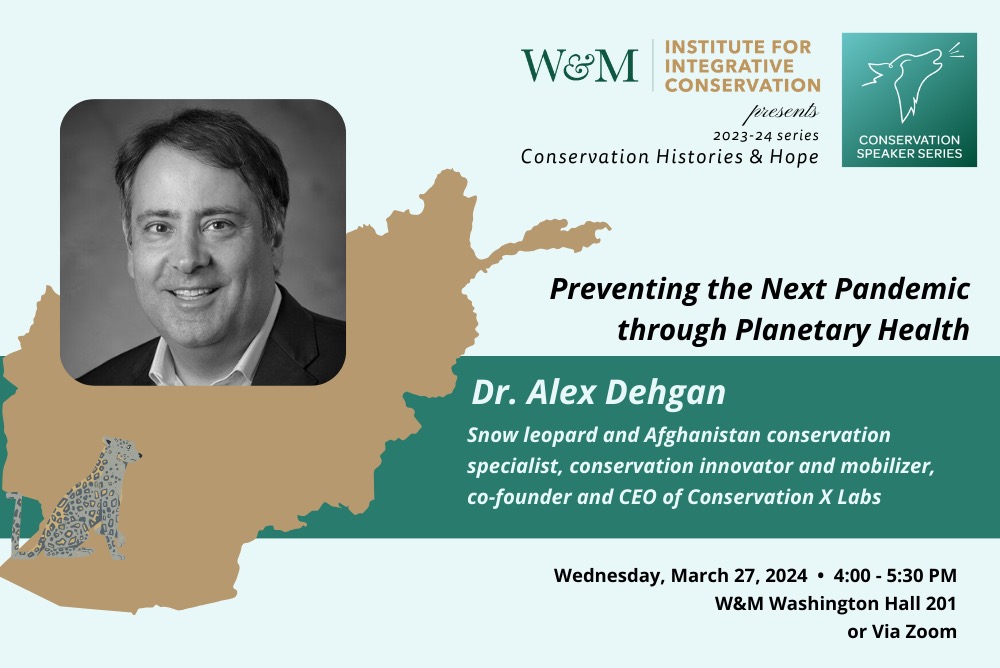Modern Languages & Literatures Events
[PAST EVENT] Alex Dehgan: "Preventing the Next Pandemic through Planetary Health"
Access & Features
- Open to the public
- Registration/RSVP

Join us for Preventing the Next Pandemic through Planetary Health, with Dr. Alex Dehgan, part of the Institute for Integrative Conservation’s 2023-24 Conservation Speaker Series: "Histories and Hope".
Wednesday, March 27, 2024
4:00 - 5:30 PM Eastern
W&M Washington Hall 201
Williamsburg, VA 23185
This event is free and open to the public, and it will be live-streamed via Zoom for a virtual attendance option. Register below for in-person or Zoom attendance.
Much of the world's population lives in close proximity to animals and natural environments; such proximity translates into greater disease risks. More than half of the 1,407 recognized infectious diseases are shared between humans and wildlife ("zoonotic"); such zoonotic pathogens are twice as likely to be emerging or reemerging, than are nonzoonotic pathogens. Since the 1970's, 75% of Emerging Infectious Diseases (EIDs) have been at the human-wildlife boundary, with new infectious diseases emerging at a faster rate than ever before.
A common, defining feature of EIDs is that they are triggered by anthropogenic changes to the environment. As natural environments degrade (specifically, due to climate change, loss of biodiversity and fragmentation of habitats, or invasive species), they are more likely to harbor infectious diseases and their vectors (animals or plants that transmit a pathogen). Understanding and addressing how such environmental changes may affect the spread of disease allows us to mitigate or even prevent outbreaks in the future.
The U.S. has invested significant resources to prepare for, monitor, and respond to outbreaks of existing infectious diseases. Although this investment has been insufficient as we have seen in COVID-19, there is a bigger issue: How do we avoid the next 10 pandemics? These "downstream" responses fail to address the origination of novel emerging infectious diseases, i.e. how such diseases initially arise, or the factors that accelerate their spread. We need to focus on factors that greatly contribute to disease emergence: our food systems and supply chains, environmental degradation, climate change, and the movement and trade of wildlife and wildlife products.
We have an unprecedented opportunity to create a world where we anticipate, plan for, and mitigate pandemics before they happen, and even prevent them from emergence, benefiting human health and planetary health at the same time. We have the ability to prevent the next pandemic, or at least, reduce the chance that it will happen.This requires a rethinking of fields we see as dissimilar – global health, food security, and conservation science.
About Alex Dehgan
Dr. Alex Dehgan is the CEO of Conservation X Labs, which harnesses innovation and frontier technologies to prevent the 6th Mass Extinction. Dehgan helped found the field of conservation technology.
Alex Dehgan is Professor of Practice of Sustainability and Global Futures at Arizona State University. Alex previously served as the Chief Scientist of USAID, with rank of Assistant Administrator and created the Agency’s “DARPA for Development”. He designed and launched the US Government’s Grand Challenge for Development program. Dr. Dehgan has worked in multiple positions in the Office of the Secretary at the State Department, including positions focused on Iran, Afghanistan, Syria-Lebanon, and the broader Islamic world and focused on advancing science for diplomacy, planetary health, and national security. Dr. Dehgan served as the Special Adviser for Nonproliferation as part of the Coalition Provisional Authority, where he established and ran the redirection program for former nuclear, chemical, and bioweapon scientists.
Alex was the founding country director of the Wildlife Conservation Society’s Afghanistan Program and helped create Afghanistan’s first national park. He is the author of the book, The Snow Leopard Project, which describes the effort. The book won the Gold 2020 Nautilus Book Prize.
Dr. Dehgan holds a Ph.D. in Evolutionary Biology from the University of Chicago, a J.D. from the University of California, Hastings College of the Law, and a B.S. with Distinction from Duke University. Dehgan has won multiple awards from the Departments of State and Defense, was selected by AAAS Science Policy Fellowship as one of 40@40 honorees, was named an Icon of Science by Seed Magazine, and received the World Technology Award. In 2020, he was given the University of Chicago’s Medical and Biological Alumni Association’s highest honor.
Follow Alex Dehgan
Conservation X Labs: conservationxlabs.com
X (formerly Twitter): @lemurwrangler
Sponsored by: Institute for Integrative Conservation
Contact
https://www.wm.edu/offices/iic/
This Event Appears On
- Arts & Sciences Events
- Government Events
- International Relations Events
- Modern Languages & Literatures Events
- Public Policy Events
- Center for Geospatial Analysis Events
- Arabic Studies Events
- Reves Center for International Studies Events
- Sustainability Events
- Global Research Institute
- Whole of Government Events
- Institute for Integrative Conservation Events
